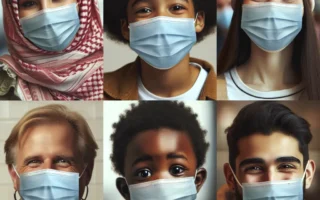The Effectiveness of Masks in Reducing the Spread of Respiratory Illnesses
Wearing masks has been widely discussed in the context of public health, particularly in relation to their effectiveness in reducing the spread of respiratory illnesses. Studies have shown that masks can play a crucial role in preventing the transmission of contagious diseases, such as the flu and COVID-19. The use of masks acts as a physical barrier that can block virus-carrying respiratory droplets from entering the air and being inhaled by others.
Research indicates that the effectiveness of masks in reducing the spread of respiratory illnesses is influenced by various factors, including the type of mask, proper fit, and consistent usage. N95 respirators and medical-grade surgical masks are among the most effective options, as they are designed to filter out small particles and provide a secure seal around the face. Cloth masks, while less effective than medical-grade options, still offer valuable protection by capturing respiratory droplets when worn properly.
Furthermore, the collective use of masks within a community or population can significantly contribute to limiting the overall transmission of respiratory illnesses. When a large percentage of individuals wear masks in public settings, the likelihood of virus-laden droplets being released into the environment is notably reduced, thereby lowering the risk of infection for everyone. This emphasizes the importance of widespread mask-wearing as a public health strategy, especially during disease outbreaks and in high-density areas.
In conclusion, the evidence supporting the effectiveness of masks in reducing the spread of respiratory illnesses is substantial. Implementing policies and promoting mask-wearing initiatives can make a tangible difference in safeguarding public health and controlling the transmission of contagious diseases.
The Psychological and Societal Implications of Mask-Wearing
The widespread use of masks in public places has had a significant impact on public health during the current global pandemic. However, in addition to the physical benefits, it’s important to also consider the psychological and societal implications of mask-wearing. For many individuals, wearing a mask can provoke feelings of anxiety, claustrophobia, or even a sense of detachment from others due to the obscured facial expressions. This has the potential to impact mental well-being, especially for those already susceptible to anxiety or other mental health issues.
On a societal level, the use of masks has led to changes in social interaction and communication. The inability to see facial expressions and mouth movements can lead to challenges in effective communication, particularly for individuals who rely on lip-reading or non-verbal cues. Additionally, the presence of masks may create a sense of anonymity, which has been linked to changes in social behavior, including increased aggression or a diminished sense of responsibility.
Understanding these psychological and societal implications is crucial in order to address the broader effects of mask-wearing on public health. Efforts to promote awareness, provide mental health support, and improve communication strategies can help mitigate the negative impact of masks on individuals and society as a whole.
Navigating the Debate: Balancing Individual Rights and Public Health in Mask Mandates
When it comes to the impact of wearing masks on public health, there is an ongoing debate about the balance between individual rights and the collective benefits of mask mandates. The issue of mandating masks in public spaces has highlighted the tension between personal freedom and the responsibility to protect public health. While some argue that mandating mask-wearing infringes on individual liberties, public health experts emphasize the importance of collective action to mitigate the spread of infectious diseases.
In navigating this debate, it is crucial to recognize that public health measures often require a delicate balance between individual freedoms and communal well-being. Advocates of mask mandates underscore the role of masks in reducing the transmission of respiratory droplets and preventing the spread of airborne viruses. Despite the controversy surrounding mask mandates, studies have shown that widespread mask-wearing can significantly decrease the incidence of respiratory infections within communities.
Furthermore, it is essential to acknowledge that public health interventions, including mask mandates, are not implemented to infringe upon individual rights, but rather to safeguard the well-being of the entire population. In the context of a public health crisis, prioritizing the greater good is imperative for controlling the spread of infectious diseases and protecting vulnerable members of society.
In conclusion, while the debate over mask mandates and individual rights continues, it is crucial to recognize the collective benefits of implementing public health measures, such as wearing masks in public spaces. Balancing the need to protect public health with respecting individual freedoms requires thoughtful consideration and a nuanced approach to address the complex dynamics at play in the ongoing public health discourse.



